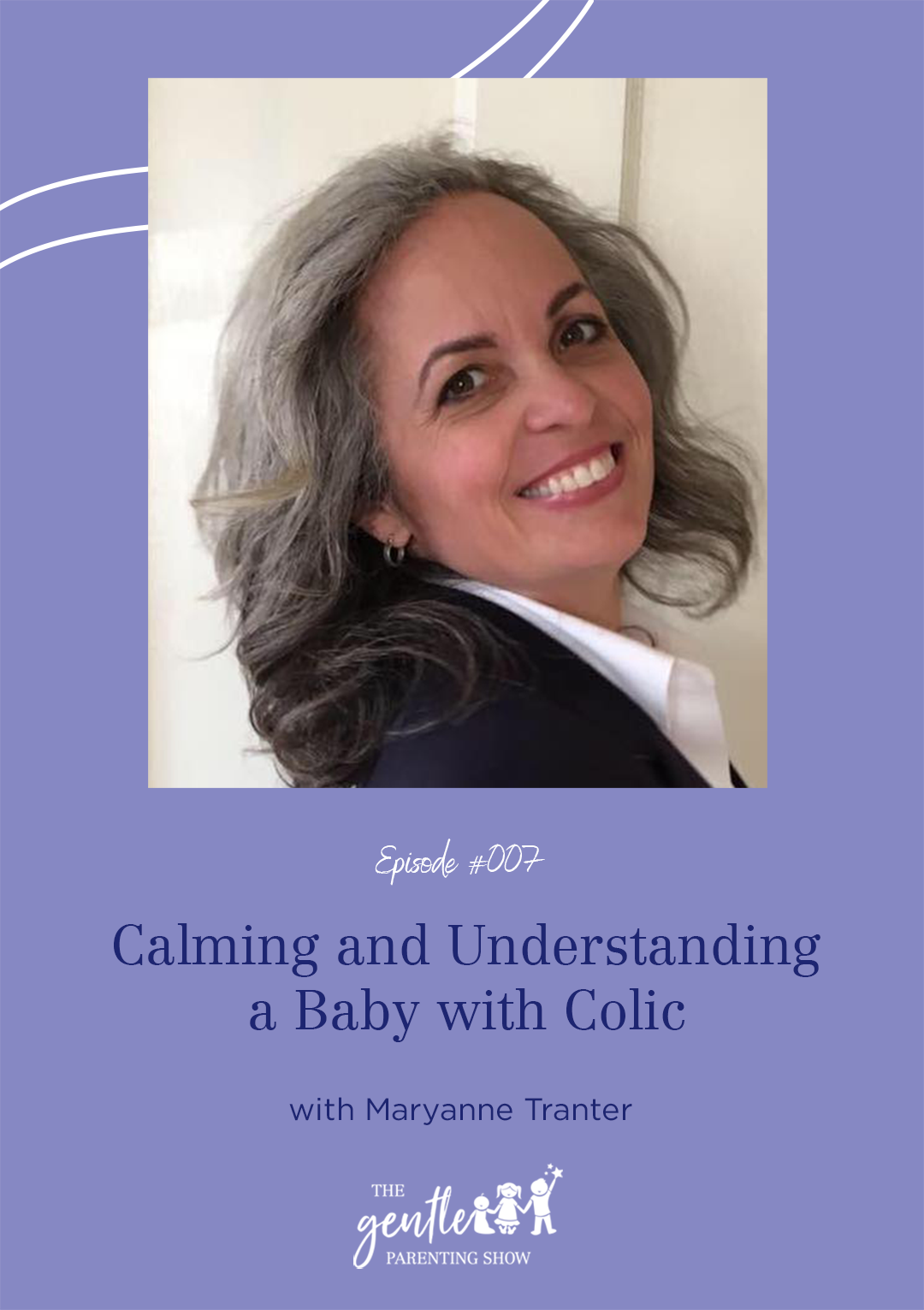In today’s episode of The Gentle Parenting Show, Kim spoke with Dr. Maryanne Tranter, an expert pediatric nurse practitioner, researcher, and parent mentor. Dr. Tranter is the founder of The Healthy Child Concierge where she helps parents with their anxieties and worries for their children and works to resolve them. Dr. Tranter has 25 years of experience in caring for families dealing with colic. She also teaches nursing students, trains staff in pediatric offices, and has executed hospital-wide staff education. Today, Kim and Dr. Tranter discuss calming colic and reflux (Dr. Tranter’s specialty) and what those terms actually mean, and how you can find comfort and peace while your child is suffering from colic.
What is Colic?
Dr. Tranter first clarifies that colic is a symptom. Like a fever, colic is a symptom of something going on with your child. In a lot of cases, a baby is given the diagnosis of colic, because the practitioner isn’t sure of what else is going on. But, by definition, colic is excessive crying under 5 months of age with no known cause.
But, what’s “normal” for a baby? For babies under 5 months, it’s normal to cry for 1-2 hours a day. Colic babies will cry for more than double that, around 3-4 hours a day. Dr. Tranter says she wants parents to understand that there are all different levels of “normal” and something that is causing pain and crying, shouldn’t be seen as normal just because it’s “common”.
3 Causes of Colic That Can Be Overlooked
As discussed earlier in the podcast, colic is a symptom, so it’s important to look at possible causes of it. There are 3 main causes that could have colic as a symptom – and Dr. Tranter walks through them all in this episode.
1. Tongue and Lip Ties
A baby shouldn’t be diagnosed with a tongue and lip tie at birth, but rather when they are a few weeks or months old and are having issues latching and eating. A tongue and lip tie affects latching and causes the baby to get a lot of air into their system, which causes an uncomfortable stomach and then a lot of crying for your baby!
2. Reflux
Reflux, especially silent reflux, is a major cause of colic. This happens when food (breastmilk or formula) comes into the baby’s stomach and the stomach muscle pushes the food back up. You can tell when your baby is suffering from reflux because they’ll arch their back in rigid pain.
3. Food Allergy or Intolerances
When it comes to food allergies, soy and cow milk are the most common. The allergies can present themselves because it causes an inability to break down larger proteins. This causes discomfort, and therefore fussiness, in the baby.
What Can You Do About Calming Colic?
A lot of families who go through colic, come out with PTSD. This is totally understandable – as it is a very traumatic time for both the parents and the child. Many times when a parent brings their colic-y baby into a pediatrician’s office, the provider isn’t sure what to do. Rest assured, babies can outgrow colic. As they grow and their bodies mature, they can process proteins in a more effective way.
The most important thing a parent can do for colic is to advocate for their baby. Sometimes that can look like challenging your doctor about time frames and asking questions like what else can we try? What else can we do? Is there new information that we can test out? What can we do about reflux? You can ask a doctor about different formulas to try. You can ask for a reference for a dietitian to see if you need to try an elimination diet (as a breastfeeding parent).
Products for Calming Colic
While you can be assured that a baby will outgrow colic, there are things you can do in the meantime to soothe your baby. You can hold them upright, hold them on their stomach and help them lay on their left side. A colic-y baby may also need increased stimulation like a warm bath, a walk, or skin-to-skin contact. There are also great products on the market to help a baby deal with an upset stomach, and therefore colic. Dr. Tranter recommends the Windi by BabyFrieda as well as two great probiotics that have been shown to make babies cry less – Reuteri and Breve. While no product is a miracle worker, Dr. Tranter gives peace of mind by saying “using these tools to decrease crying, to give babies rest and peace, to give parents rest and peace, while you’re working through getting to the root of the problem, these all can work together to help soothe the baby and you.”
When to Get Help as a Parent
Many parents and families that have colic-y babies struggle with PTSD. Colic is so stressful on both the baby and parents’ bodies. Parents often see the stress impacting their lives when it comes to sleep and weight levels.
There is also a high correlation between postpartum depression and anxiety and colic. As a parent, know that you also need support and help during this difficult time. Talk to your doctor about finding a path that best helps you, whether through therapy or medication. Dr. Tranter suggests looking for a specialist in maternal depression.
Kim and Dr. Tranter also discuss having a solid and supportive group around you during this phase. Whether that’s online or in-person, having supportive and listening adults can help you deal with the trauma of colic. Accept help from friends and family.
Most importantly, parents need to remember that colic is not their fault. Your baby crying is not your fault. Dr. Tranter reassures parents by saying “you are not alone, there are people that want to support you, to get to the bottom of this, there are other parents going through this as well.”
Connect with Dr. Tranter
- Dr. Tranter’s WEBSITE for resources about colic and the newborn stage
- Her FREE DOWNLOAD on resources to calm your colic-y baby





